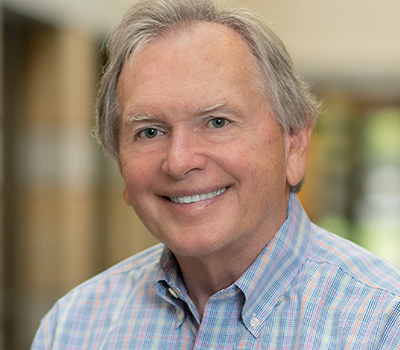Disadvantaged entrepreneurs often fear success, but new research can help

When low-income entrepreneurs start their own businesses, they frequently fear failure — a well-documented phenomenon. But over time, they may also fear success, given the costs and unknowns it can bring, and this barrier to growth is under-studied and underappreciated. A new study from a Keough School of Global Affairs expert breaks new ground by explaining this fear and offers five recommendations to help entrepreneurs overcome it and move out of poverty.
Michael H. Morris, a professor of the practice in the University of Notre Dame’s Keough School and director of the Urban Poverty and Business Initiative, a program offered by the school’s McKenna Center for Human Development and Global Business, is lead author of a journal article where these recommendations are outlined, as recently published in Business Horizons.
“This study is one of the first to deepen our understanding of the fears that poor entrepreneurs commonly face, in particular the unexpected and counterintuitive fear of success,” Morris said. “We believe it’s crucial to address these fears, or they can become a behavioral roadblock that prevents individuals from navigating the uncertainties of creating a new business. We have identified several key priorities that policymakers and support organizations can focus on in order to work more effectively with them.”
Five key priorities
Morris and his co-authors documented the fears experienced by many disadvantaged entrepreneurs by conducting six focus groups with participants from the Urban Poverty and Business Initiative program.

More than 90 percent of participants were people of color and 68 percent were women. Approximately 4 percent were formerly incarcerated, 2 percent were refugees and 1 percent were women who lived in shelters. All came from underprivileged backgrounds. The research was funded with support from WorkRise, a research-to-action network hosted by the Urban Institute.
Disadvantaged entrepreneurs face specific obstacles that mid- and higher-income businesspeople generally do not, Morris said, including lower literacy levels, a scarcity mindset, significant non-business distractions and lower access to finance.
Fear is a common occurrence for people in this group, Morris said, whether it is at the start of a new venture or as a business gains traction and encounters new challenges. And fear of success — while less studied — can have damaging outcomes, Morris said, because it can lead to procrastination, self-sabotage and failure to make key decisions that could help a business grow.
Ultimately, Morris and his co-authors issued five recommendations to help address these fears:
- Providing entrepreneurial role models to help individuals recognize different paths to, and outcomes from, a successful enterprise
- Teaching entrepreneurship early, with an emphasis on experiential learning, where success is made more tangible and manifested in different ways beyond just profitability
- Providing mentorship, where experienced entrepreneurs help business founders understand and address the costs versus benefits of different types and degrees of success
- Positioning venture creation as an option in workforce development programs (These programs traditionally focus on training participants to work for others.)
- Developing more flexible and holistic microfinance programs where investments are tied to incremental progress in meeting success goals and targets
A playbook for policymakers and support organizations
Morris co-authored the study with Donald F. Kuratko of Indiana University, Susana C. Santos of Florida State University and Sohab Soleimanof of Louisiana State University. The authors drew on their deep experience to create a playbook they believe can assist policymakers and people who work with disadvantaged entrepreneurs.
Ultimately, Morris said, while success might seem scary and costly to underprivileged businesspeople, identifying a handful of key priorities can focus and sharpen initiatives aimed at helping them succeed.
“We hope that educators, policymakers and the various stakeholders who work with poor entrepreneurs will apply these recommendations,” he said, “and, in so doing, help them overcome their fears and embrace entrepreneurship as a viable pathway out of poverty."
Originally published by Josh Stowe at keough.nd.edu on May 2.
Contact: Tracy DeStazio, associate director of media relations, 574-631-9958 or tdestazi@nd.edu
Latest Colleges & Schools
- Prioritizing prenatal care may decrease low birth weight outcomes in The Gambia, Notre Dame research findsA new study co-authored by University of Notre Dame researchers highlights the importance of prenatal care for improving the health of mothers and newborns, providing evidence that can inform policy.
- Partial peace deals may facilitate comprehensive accords, offering roadmap for policymakers, practitionersPartial peace agreements — deals that address targeted issues on the way to larger comprehensive accords — could provide a blueprint for peacebuilding policymakers and practitioners, according to new University of Notre Dame research.
- Notre Dame Law School launches new Veterans Law ClinicNotre Dame Law School is launching a new Veterans Law Clinic, dedicated to providing free legal assistance to U.S. military veterans in matters such as disability claims and appeals.
- City of Gary and Notre Dame’s Housing and Community Regeneration Initiative announce vision and action plan for downtown GaryThe City of Gary and the University of Notre Dame School of Architecture’s Housing and Community Regeneration Initiative announced a “Vision and Action Plan” for downtown Gary during a news conference Tuesday (May 27). The final report serves as a roadmap for Gary’s leadership to follow to reestablish the city’s building culture.
- Notre Dame Executive MBA offers scholarships to area leadersMichiana Forty under 40 honorees can receive $30,000 toward tuition for the Notre Dame EMBA program.
- Kenneth Scheve appointed dean of the University of Notre Dame’s College of Arts and LettersKenneth Scheve, the Dean Acheson Professor of Political Science and Global Affairs and the dean of social science at Yale University, has been appointed the I.A. O’Shaughnessy Dean of the College of Arts and Letters by University of Notre Dame President Rev. Robert A. Dowd, C.S.C. Scheve, who will also hold a tenured faculty position in the Department of Political Science, begins a five-year term as dean on July 1.













